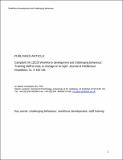Files in this item
Workforce development and challenging behaviour : training staff to treat, to manage or to cope?
Item metadata
| dc.contributor.author | Campbell, Martin | |
| dc.date.accessioned | 2013-03-07T17:31:01Z | |
| dc.date.available | 2013-03-07T17:31:01Z | |
| dc.date.issued | 2010-09 | |
| dc.identifier | 3928094 | |
| dc.identifier | 708af0ce-59ae-4424-b27f-3637d395a10e | |
| dc.identifier | 78651231371 | |
| dc.identifier.citation | Campbell , M 2010 , ' Workforce development and challenging behaviour : training staff to treat, to manage or to cope? ' , Journal of Intellectual Disabilities , vol. 14 , no. 3 , pp. 185-196 . https://doi.org/10.1177/1744629510385624 | en |
| dc.identifier.issn | 1744-6295 | |
| dc.identifier.uri | https://hdl.handle.net/10023/3382 | |
| dc.description.abstract | Staff working directly with adults challenging behaviours in learning disability services need to be very good at what they do. They also need to want to do the job. A theory-practice gap exists, however, between what is known about effective, evidence-based approaches and whether and how these are used in person-centred, community services. Many front line staff working with people with the most serious challenging behaviours do not have the skills to implement programmes to change behaviour. This discussion paper reviews workforce development in the context of clinical and service guidelines and asks whether the legitimate purview of frontline staff is a balance of treating challenging behaviour, managing it or to simply coping with it on a daily basis, whilst maintaining the best quality of life possible for service users. | |
| dc.format.extent | 77418 | |
| dc.language.iso | eng | |
| dc.relation.ispartof | Journal of Intellectual Disabilities | en |
| dc.subject | Challenging behaviour | en |
| dc.subject | Workforce development | en |
| dc.subject | Staff training | en |
| dc.subject | HV Social pathology. Social and public welfare | en |
| dc.subject.lcc | HV | en |
| dc.title | Workforce development and challenging behaviour : training staff to treat, to manage or to cope? | en |
| dc.type | Journal article | en |
| dc.contributor.institution | University of St Andrews. School of Psychology and Neuroscience | en |
| dc.identifier.doi | https://doi.org/10.1177/1744629510385624 | |
| dc.description.status | Peer reviewed | en |
| dc.identifier.url | http://www.scopus.com/inward/record.url?scp=78651231371&partnerID=8YFLogxK | en |
This item appears in the following Collection(s)
Items in the St Andrews Research Repository are protected by copyright, with all rights reserved, unless otherwise indicated.

